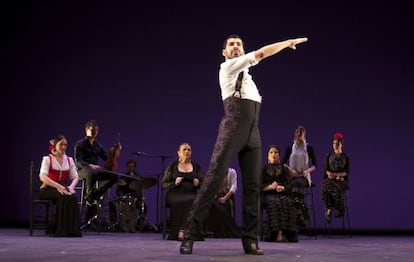Flamenco in flight
Spain¡¯s deep economic crisis is forcing artists to perform increasingly abroad


Spain¡¯s flamenco artists are being driven to perform abroad more than ever as a result of the crisis. The massive recent rise in the value-added tax rate on theatrical performances, which went up from eight percent to 21 percent last September, coupled with a crisis that, in the best of cases, has seen culture department budgets slashed in half, have reduced the number of work opportunities available to performers at home, forcing them to look for new markets outside of Spain and, in some cases, lower their appearance fees.
There are at least 44 festivals devoted exclusively to flamenco around the world and the number keeps on growing. Brazil, Canada, Poland, Turkey and Russia are among the countries to have recently begun hosting festivals, adding to more established events in places such as France and Japan.
The Flamenco Festival, set up by composer Miguel Mar¨ªn in the United States in 2001, is a good example of how the genre is expanding around the world. Since the first edition in New York, Washington and Boston, the festival has also established itself in London, where the 10th holding of the event ended on March 27 with the premiere of Gala flamenca, the first show to be directed by dancer and choreographer ?ngel Rojas and featuring Antonio Canales, Carlos Rodr¨ªguez, Bel¨¦n L¨®pez, Jes¨²s Carmona and classical and contemporary dancer Sol Pic¨®, who showed she could also stomp her feet in pointe shoes.
"There has been much less work in Spain since 2010 and performers are more disposed to leave, even knowing that the money is much lower abroad because costs also increase," Mar¨ªn, who also heads up festivals in Chile, Brazil and Moscow, explains.
"There is a market for flamenco around the world ¡ª what we need now is for supply to adapt to the demand. In the majority of countries they pay from around 10 percent to 50 percent less than in Spain; nevertheless in Japan they pay more than at home."
We know things are bad in Spain, but in Japan we still pay the same"
Dancer and choreographer Eva Yerbabuena, who opened the London Flamenco Festival on March 15 with the premiere of her new work simply titled ?Ay!, sees traveling abroad as an inevitable career step. "We work both outside and within Spain, but there are performers who spend more time abroad," she says.
"Nobody is a prophet in their own country and even less so in this profession. First you have to leave to get your work known abroad and that is when they start to value you here." The event at the Sadler's Wells theater ended up filling 90 percent of its seats. "I receive 40 emails a day from performers who want to work with us and I guess it is because there are fewer opportunities in Spain," says Sandrine Rabassa, artistic director of the Mont-de-Marsan Arte Flamenco festival in France, which will celebrate its 25th anniversary in July.
The festival has managed to plan ahead for the crisis by attracting sponsors for some years.
Another of the great champions of flamenco in Europe is Ernestina Van de Noort, artistic director and founder of the Netherlands' Flamenco Biennial, which has been held in Amsterdam, Rotterdam and Utrecht, among other cities, since 2006. The last edition, held in January, featured big names such as Israel Galv¨¢n, Arc¨¢ngel, Mayte Mart¨ªn and Carmen Linares, among others.
"Our aim is to end the misunderstanding there is in the Netherlands that classifies flamenco as folklore, when in reality it is a very open contemporary art form," Van de Noort says.
Dancer and choreographer Yoko Komatsubara, one of the pioneers of flamenco in Japan where she has headed up her own company for the last 43 years, also organizes a festival in Tokyo. "We know that things are very bad in Spain, but we in Japan always pay the same. We haven't lowered the appearance fees even though there is also a crisis here," she says.
¡°We are saving on other things, such as the number of rehearsal days ¡ª before we had 30 and now just 10 ¡ª or the category of the hotels.¡± In July Komatsubara will direct the Sol de Espa?a festival, which will commemorate 400 years of relations between Spain and Japan.
Tu suscripci¨®n se est¨¢ usando en otro dispositivo
?Quieres a?adir otro usuario a tu suscripci¨®n?
Si contin¨²as leyendo en este dispositivo, no se podr¨¢ leer en el otro.
FlechaTu suscripci¨®n se est¨¢ usando en otro dispositivo y solo puedes acceder a EL PA?S desde un dispositivo a la vez.
Si quieres compartir tu cuenta, cambia tu suscripci¨®n a la modalidad Premium, as¨ª podr¨¢s a?adir otro usuario. Cada uno acceder¨¢ con su propia cuenta de email, lo que os permitir¨¢ personalizar vuestra experiencia en EL PA?S.
?Tienes una suscripci¨®n de empresa? Accede aqu¨ª para contratar m¨¢s cuentas.
En el caso de no saber qui¨¦n est¨¢ usando tu cuenta, te recomendamos cambiar tu contrase?a aqu¨ª.
Si decides continuar compartiendo tu cuenta, este mensaje se mostrar¨¢ en tu dispositivo y en el de la otra persona que est¨¢ usando tu cuenta de forma indefinida, afectando a tu experiencia de lectura. Puedes consultar aqu¨ª los t¨¦rminos y condiciones de la suscripci¨®n digital.








































